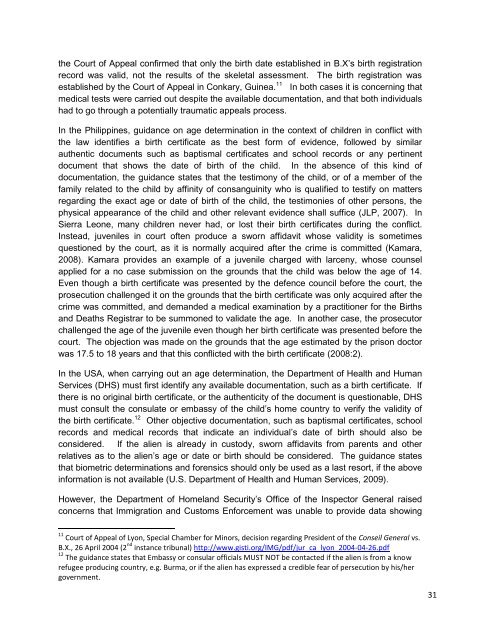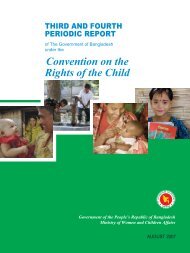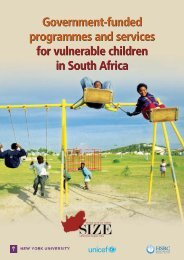Age assessment practices: a literature review & annotated ... - Unicef
Age assessment practices: a literature review & annotated ... - Unicef
Age assessment practices: a literature review & annotated ... - Unicef
Create successful ePaper yourself
Turn your PDF publications into a flip-book with our unique Google optimized e-Paper software.
the Court of Appeal confirmed that only the birth date established in B.X‟s birth registration<br />
record was valid, not the results of the skeletal <strong>assessment</strong>. The birth registration was<br />
established by the Court of Appeal in Conkary, Guinea. 11 In both cases it is concerning that<br />
medical tests were carried out despite the available documentation, and that both individuals<br />
had to go through a potentially traumatic appeals process.<br />
In the Philippines, guidance on age determination in the context of children in conflict with<br />
the law identifies a birth certificate as the best form of evidence, followed by similar<br />
authentic documents such as baptismal certificates and school records or any pertinent<br />
document that shows the date of birth of the child. In the absence of this kind of<br />
documentation, the guidance states that the testimony of the child, or of a member of the<br />
family related to the child by affinity of consanguinity who is qualified to testify on matters<br />
regarding the exact age or date of birth of the child, the testimonies of other persons, the<br />
physical appearance of the child and other relevant evidence shall suffice (JLP, 2007). In<br />
Sierra Leone, many children never had, or lost their birth certificates during the conflict.<br />
Instead, juveniles in court often produce a sworn affidavit whose validity is sometimes<br />
questioned by the court, as it is normally acquired after the crime is committed (Kamara,<br />
2008). Kamara provides an example of a juvenile charged with larceny, whose counsel<br />
applied for a no case submission on the grounds that the child was below the age of 14.<br />
Even though a birth certificate was presented by the defence council before the court, the<br />
prosecution challenged it on the grounds that the birth certificate was only acquired after the<br />
crime was committed, and demanded a medical examination by a practitioner for the Births<br />
and Deaths Registrar to be summoned to validate the age. In another case, the prosecutor<br />
challenged the age of the juvenile even though her birth certificate was presented before the<br />
court. The objection was made on the grounds that the age estimated by the prison doctor<br />
was 17.5 to 18 years and that this conflicted with the birth certificate (2008:2).<br />
In the USA, when carrying out an age determination, the Department of Health and Human<br />
Services (DHS) must first identify any available documentation, such as a birth certificate. If<br />
there is no original birth certificate, or the authenticity of the document is questionable, DHS<br />
must consult the consulate or embassy of the child‟s home country to verify the validity of<br />
the birth certificate. 12 Other objective documentation, such as baptismal certificates, school<br />
records and medical records that indicate an individual‟s date of birth should also be<br />
considered. If the alien is already in custody, sworn affidavits from parents and other<br />
relatives as to the alien‟s age or date or birth should be considered. The guidance states<br />
that biometric determinations and forensics should only be used as a last resort, if the above<br />
information is not available (U.S. Department of Health and Human Services, 2009).<br />
However, the Department of Homeland Security‟s Office of the Inspector General raised<br />
concerns that Immigration and Customs Enforcement was unable to provide data showing<br />
11 Court of Appeal of Lyon, Special Chamber for Minors, decision regarding President of the Conseil General vs.<br />
B.X., 26 April 2004 (2 nd instance tribunal) http://www.gisti.org/IMG/pdf/jur_ca_lyon_2004-04-26.pdf<br />
12 The guidance states that Embassy or consular officials MUST NOT be contacted if the alien is from a know<br />
refugee producing country, e.g. Burma, or if the alien has expressed a credible fear of persecution by his/her<br />
government.<br />
31
















